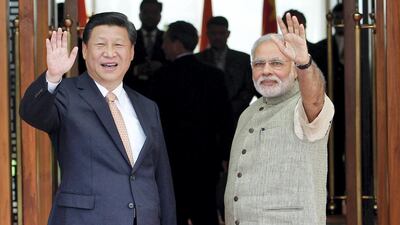China's two main Asian rivals, Japan and India, are seeking to mend their relations with it at a time of greater unpredictability in US policy under President Donald Trump's administration. This development carries significant implications for geopolitics in the Indo-Pacific region and could strengthen Chinese President Xi Jinping's hand just when he has made himself China's absolute ruler by dismantling the collective leadership system that Deng Xiaoping helped institutionalise.
Add to the picture Australia’s hedging of its bets, despite a national furore there over China’s interference in its internal affairs and America’s persistently cautious approach toward Beijing, seeking neither overt competition nor confrontation.
All this gives Mr Xi the strategic space to carry on with his muscular and revisionist foreign policy, reflected in China’s growing military assertiveness in the vast Indo-Pacific region, which stretches from the Pacific to the Horn of Africa and the Middle East.
An intense pace of top-level meetings is setting the stage for improving Sino-Indian and Sino-Japanese relations.
Chinese Premier Li Keqiang's visit to Japan visit this month follows Indian Prime Minister Narendra Modi's April "informal" summit meeting with Mr Xi in Wuhan, China.
The Wuhan summit came just days after Wang Yi became the first Chinese foreign minister to visit Japan for bilateral talks since 2009.
After his summit with Mr Modi, Mr Xi spoke to Japanese Prime Minister Shinzo Abe by phone. Tokyo and Beijing are working to arrange reciprocal visits by Mr Abe to China and Mr Xi to Japan.
While the US remains a central factor in influencing the regional geopolitical landscape, China, Japan and India constitute Asia’s strategic triangle. They form a scalene triangle with three unequal sides, with China representing the longest side. In this triangle, if Japan and India unite, China cannot hope to gain pre-eminence in Asia.
The relationship between Japan and India is growing fast, yet each of them feels a strategic imperative to try to improve strained ties with China.
Deteriorating ties with Beijing make Tokyo and New Delhi more dependent on an unpredictable Trump administration, whose transactional approach to foreign policy is troubling all US allies and strategic partners. If Japan and India can mend their troubled relations with China, they will be able to inject greater flexibility and manoeuvrability in their foreign policy strategies.
Beijing has its own strategic reasons to ease tensions with New Delhi and Tokyo, including preventing the formation of a broader anti-China front and muting or lowering Indian and Japanese criticisms of its policies and moves.
While Mr Abe is the author of the "free and open Indo-Pacific" concept that the Trump administration is now pushing, Mr Modi's government was the global leader in denouncing Mr Xi's signature One Belt, One Road initiative as opaque, predatory and neocolonial – a description that has now gained wide international currency.
In seeking better relations with Beijing, Japan and India appear to have separately acknowledged the broader regional trend of countries hedging their bets on China’s rise. Through hedging, countries are seeking to ensure their strategic choices are not narrowed or crimped.
US policy has unwittingly encouraged hedging strategies in the Indo-Pacific. For example, while using the China threat to win new strategic partners and strengthen existing alliances, the US has been reluctant to resourcefully push back against Beijing’s territorial and maritime revisionism or take concrete steps to help rein in its military assertiveness.
Washington’s kid glove treatment has emboldened China to step up its creeping aggression to change the status quo in its favour.
Just like it stayed silent when China seized the disputed Scarborough Shoal from the Philippines in 2012, Washington did not side with India but stayed neutral during last summer's Sino-Indian military stand-off, triggered by a Chinese move to change the status quo on the Doklam Plateau.
_____________________________
Read more from Opinion:
Brona Ni Uigin: Palestinian children bear the brunt of Israeli violence
Peter Hellyer: There are new challenges needing our activism across the world
_____________________________
A more powerful example is the South China Sea, where China has incurred no international costs for creating artificial islands and militarising disputed features in international waters.
On trade issues, Mr Trump is treating allies and China alike. He has gone to the extent of publicly shaming Japan, India and South Korea, although their combined trade surplus with the US – $95.6 billion last year – pales in comparison to China’s $337.2 billion trade surplus, according to official US data.
Mr Trump has made South Korea accept a revamped trade deal, squeezed India’s information technology industry and forced Mr Abe to agree to new trade dialogue, despite Tokyo’s aversion to bilateral trade agreement negotiations with Washington.
Indeed, despite raising the spectre of a potential trade war with Beijing, Mr Trump has yet to impose a sweeping trade sanction against China.
Against this backdrop, it is scarcely a surprise that Washington has still to provide strategic heft to its “free and open Indo-Pacific” strategy or that the US, Japan, India and Australia have yet to take concrete steps to institutionalise or even crystallise the “Quad”, which remains just an initiative for dialogue among their bureaucrats.
However, the Japanese and Indian efforts to improve relations with Beijing work to China’s advantage.
The mere semblance of better relations with Tokyo and New Delhi increases Mr Xi's strategic space to advance his grand strategy of making China great again – a goal that implies keeping China's potential peer competitors like Japan and India in check.
Without making any concessions to India and Japan or even easing China’s revisionist activities in the Himalayas, the Indian Ocean and the East China Sea, Mr Xi’s appreciation of Indian and Japanese overtures and positive Chinese statements could help instill greater caution and reluctance in New Delhi and Tokyo to openly challenge China.
Brahma Chellaney is a geostrategist and the author of the award-winning Water: Asia’s New Battleground.

